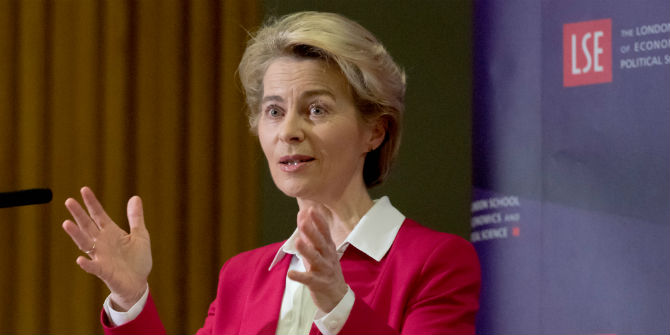The UK should move forward from financial services equivalence with the EU, writes Apostolos Thomadakis (CEPS). Furthermore, it should develop a clear focus for the City of London as a non-EU financial centre.
After nine rounds of negotiations held between March and October 2020, covering eleven areas, the EU-UK Trade and Cooperation Agreement (TCA) was concluded on December 24th. It is fair to say that the City has ended up with a No-Deal Brexit in terms of financial services. There is nothing substantive in the agreement itself for financial services as the negotiations did not deal with the bulk of financial services, despite their strategic importance for the UK economy. Equivalence, which is not a panacea, is not part of the agreement, its determination is a political judgment, and only solves a few small areas of the Brexit puzzle. The UK should be pragmatic and move forward. It should develop a clear focus for London as a non-EU financial centre, prioritise the EU business that can still be done through London, and collateralise on its deep financial services culture, critical mass and economies of scale that made London a global financial centre.
The TCA does not include any provisions that make up for the loss of passporting rights, nor any provisions on equivalence or regulatory cooperation in the area of financial services. In fact, the only specific financial services provisions in the TCA concern:
- the general commitment to implement international standards in the area of prudential, anti-money-laundering, tax avoidance and anti-terrorism standards;
- any new services that could be supplied under existing regulation; and
- guaranteed access for UK firms to any self-regulatory bodies required for the conduct of their business and to public clearing and payment systems.
These provisions are subject to a prudential carve-out, meaning that each party may take any measures deemed necessary to protect its consumers and investors, or the integrity of its financial system.
Although the UK is entitled to ask for equivalence treatment, this is only available where it is explicitly envisaged in the EU legislation. Equivalence allows non-EU financial institutions to offer a limited number of services in the EU, given that the EU recognises their home country regulatory framework as ‘equivalent’ to EU standards. However, equivalence clauses are designed for the needs of each specific act, thus their meaning may vary substantially from one legal text to another.

Currently, the UK has only two equivalence decisions, one for central securities depositories (CSDs), and another one for central counterparties (CCPs). These two decisions – out of the 39 potential equivalence agreements envisaged under EU financial services law – are a long way from the ‘permanent and comprehensive equivalence’ the UK was asking for a year ago. For comparison, Australia and Canada have 19 and 20 equivalence decision agreements respectively, while the US has 23.
Equivalence does not have a horizontal impact across different activities in financial markets. In equity trading for example – an activity that is entirely dependent on equivalence for stock exchanges – around 41 per cent of the total value of trading on UK platforms is in EU-27 stocks and 59 per cent in UK stocks. On the other hand, approximately 13 per cent of the value of derivatives contracts through UK CCPs are with an EU clearing member, and thus subject to equivalence. In addition, only 7 per cent of EU derivatives trading is affected by the Derivatives Trading Obligation (DTO). In other words, although equivalence is important in some sectors, in others is less.
Since 1 January 2021 the UK and EU financial services industries have been operating under a ‘no-deal scenario’, where the bulk of financial services provisions will be based on unilateral equivalence decisions with regard to specific activities and types of financial services. To protect itself and avoid potential ‘cliff-edge’ effects, the Temporary Permissions Regime (TTR) adopted by the UK government allows relevant EEA financial firms and funds that had previously operated through an EU passport in the UK, to continue their operations temporarily.
Furthermore, and regarding equivalence decisions to access its market, the UK has adopted an outcomes-based approach, something that was proposed during the 2020 trade negotiations but rejected by the EU. This more flexible interpretation of equivalence implies that a third-country regulatory framework can be considered equivalent to UK standards even if specific regulations differ, as far as they achieve a similar outcome. Thus, is not about having identical rules, but rather whether these rules achieve common outcomes.
Alongside the TCA, the two parties have adopted a Joint Declaration on Financial Services Regulatory Cooperation, which allows for transparency and dialogue on equivalence decisions. Although the EU and the UK commit to future dialogue on financial services, there is no clarity as to what shape this dialogue will take, nor on whether and how it will impact the EU’s current equivalence framework. The Joint Declaration is an agreement to agree at a later stage some of the detail on financial services. A framework for this cooperation – a Memorandum of Understanding (MOU) – is due to be agreed upon by March 2021. However, this broad and nonbinding commitment to regulatory cooperation is noticeably different from the guaranteed single market access that UK financial services firms had until 31 December 2020. The MOU will more likely be about the process of dialogue, cooperation and transparency, and not about agreeing on common regulations which might be a foundation for subsequent equivalence rulings.
Equivalence only solves a few pieces of the Brexit puzzle. Most firms have relocated, and having done so they now got that access to EU markets and EU clients. If the UK wants strategic autonomy, and be able to set the rules and have control over supervision and regulation – as Andrew Bailey, the Governor of Bank of England has repeatedly said – then perhaps equivalence is not the right tool. The Commission’s recent decision to grant equivalence to US CCPs and allow them to operate throughout the bloc is an indication that the EU will likely increase pressure on UK and EU firms to relocate and develop a local capacity for clearing inside the EU, instead of relying on clearing in London. The EU may feel encouraged to squeeze the UK harder and perhaps look at repatriating in other sectors beyond equity trading, derivatives and clearing.
Early 2021 data show that equity trading has moved from the City of London to Amsterdam, in other areas such as derivatives and foreign exchange, London’s daily trading volumes still vastly outweigh its European neighbours. In fact, one segment that has been unaffected by Brexit is currency trading. Opposite to shares and bonds, which they usually trade in the market where they are issued, currency trading takes place globally. According to the latest BIS data, the UK has 43 per cent of the global forex market, 48 per cent of the euro FX trading, and 44 per cent of the global USD turnover. Fintech is another sector where the UK has retained its role as the top-ranking investment destination globally and in Europe. In 2020, €3.7bn venture capital and growth private equity invested across a total of 408 deals in the UK. For comparison, the US attracted €19.7 billion, while Europe €4.7 billion.
The pre-eminence in finance that London enjoys is a vital component as the UK emerges from Brexit. London should maintain and enhance standards and regulatory oversight that will allow firms to continue to have confidence in London as a place to do business. No longer having to coordinate and agree with 27 EU countries should enable the UK to be more flexible in this regard, and allow it to corner emerging areas such as fintech and tech investment, as well as green finance. For example, by developing and regulating new financial products that will allow investors to positively engage with climate-change finance and cryptocurrencies.
Although financial services business may continue to be at a loss as a result of Brexit, the UK needs a thoughtful and future-focused approach that will allow it to bounce back. Thus, priority should be given to how the UK can develop a focus on London as a non-EU financial centre, how much EU business can still be done through London, as well as on how to further maintain and enhance its several competitive advantages.
This post represents the views of the author(s) and not those of the Brexit blog, nor of the LSE.







Yes and No. It really is a strategic decision regarding the economic divergence of the UK and EU, with divergence in one sector leading to (possible) gains (financial sector) and losses in another (e.g. fishing, manufacturing and agriculture).
I totally agree John. It really depends on the sector, as well as the specific activities within the sector.
“For comparison, Australia and Canada have 19 and 20 equivalence decision agreements respectively, while the US has 23.”
I have read that international law requires the EU to treat countries impartially. It can’t arbitrarily give an equivalence to one country but not another without good reason. Is that correct? Since the UK was fully aligned with the EU in December, then it should be particularly eligible for equivalence. The EU seems to want assurances about the UK’s future plans but since either side can withdraw an equivalence with 30 days notice, they have no basis to ask for this.
The interesting question is what part did the City of London play in supporting the Euro in 2012/2013? I have read hints that the UK was obliged to restrain its capitalisation requirement for banks so as to prevent certain European banks from going under. There is a post-pandemic financial crisis around the corner. The EU needs to think carefully about what support it may need from the City of London. (Worth mentioning, as an aside, that if Germany had supported the UK during the ERM crisis then, we probably would have adopted the Euro and made Brexit infeasible.)
There is certainly not an impartial treatment when it comes to equivalence. And in the case of Brexit, it is just a political decision.
As for the role that London played in supporting the euro during the sovereign crisis, I really don’t know. I would be interested to read if you have anything to share.
On your last point, I totally agree. It feels to me that Europe wasted four and a half years (since the referendum) in just trying to make it difficult for the UK. Instead EU should have focused on how to develop its capital markets and make progress on the CMU project.